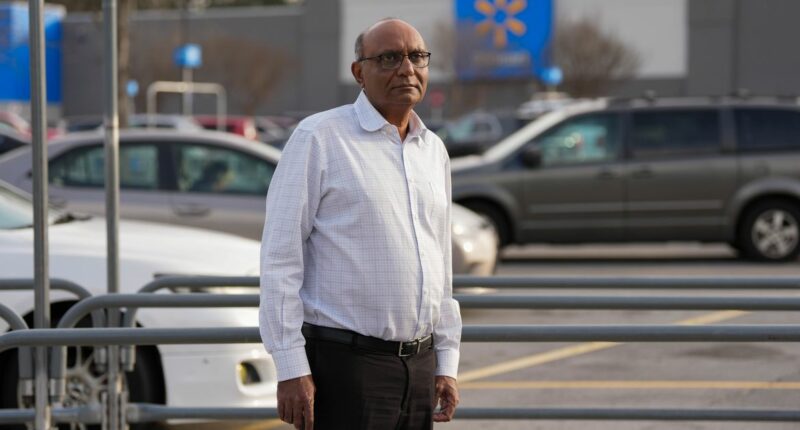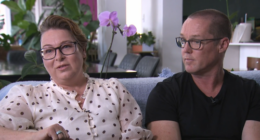Share this @internewscast.com
For Mahendra “Mick” Patel, the year 2025 marked a dramatic upheaval in his life.
What started as a simple errand for his aging mother in March spiraled into a shocking accusation of attempted kidnapping. This forced the 57-year-old to abandon his real estate career, leaving his family scrambling to clear his name.
Instead of preparing for a summer filled with vacations and joyous events, Patel found himself confined in a Georgia jail cell, constantly pondering how an apparently innocent interaction with a stranger at a Walmart could escalate into felony charges.

Though Patel had minor legal troubles before, they were nothing compared to the prolonged ordeal he was about to face—joining many Americans who claim they were falsely accused of crimes.
It was mid-March when Patel set out after dinner to visit a Walmart in Cobb County, just northwest of Atlanta.
While browsing the shelves, he noticed a woman on a motorized cart and approached her, hoping she could assist him in locating some Tylenol.
As he walked the aisles, he spotted a woman riding a motorised cart and thought she could help him find some Tylenol.
The woman, Caroline Miller, 26, sat on the cart with her two-year-old son on her lap, and an older child was sitting on the cart’s footwell.
As the two adults engaged in conversation, the scooter clipped a store display and Patel noticed the toddler looked like he was about to fall â off the scooter and his mother’s lap.

What happened next left Patel and Miller with a different understanding of the interaction.
Patel said he reached out to make sure the boy wouldn’t fall.
Meanwhile, Miller claimed the man grabbed her son out of her lap when she raised her hand to point in the direction of the Tylenol.
“I’m like, ‘No, no ⦠what are you doing?’ He pulled him,” Miller told CNN affiliate WSB in March.
“I pulled him back. We’re tug-of-warring.”
CNN has made multiple attempts to speak with Miller.
When reached by phone, her father declined to comment.
Patel, a retired engineer and father of two, left the store within a few minutes after paying for the Tylenol.
He didn’t give the encounter a second thought until three days later when he was handcuffed on the side of a Georgia highway.
He had been charged with criminal attempt to commit kidnapping, simple assault and simple battery.
“They (police officers) said ‘we have a warrant against you,’ and that’s it, they took me to jail,” Patel said.
His time behind bars depleted his body and tested his strength
For 47 days, Patel endured legal proceedings, a lack of nutrition and violent threats while being held without bond in jail, he said.
Patel went from being his own boss and a board member of a global organisation of volunteers dedicated to serving children to spending his days and nights at the Cobb County Jail among people accused or convicted of violent crimes.
His body quickly felt the strain of his new surroundings.
First, he didn’t have medication to treat his hypertension for several days and later, he lost at least 7.7kg because he would only eat milk, rice, beans and peanut butter due to a lack of vegetarian options.
With his wife out of town on work, his two adult daughters living states away and his non-English-speaking elderly mother at home unaware he was behind bars, no family members visited.
Detention wasn’t new to him.

He had been in prison once before and worked to rebuild his life after.
In 2013, Patel pleaded guilty to federal conspiracy charges after he used his IT connections from his time as an engineer in a plot to influence the bidding process for a computer project with the Atlanta Public School system.
He was also arrested on suspicion of DUI two decades ago, court records show.
Serving six months in federal prison in connection with the conspiracy charges, Patel said, was “a completely sobering experience” and led him to focus on slowly expanding his real estate business, rather than chasing the “next big thing in life.”
This time was so different.
It felt like a one-way ticket to jail with no promise of ever getting out, and the environment during confinement was marred by a constant barrage of threats to his life, which almost broke him.
Some detainees threatened to beat him in the showers and others demanded money in exchange for their protection while in jail, Patel said.

Afraid for his wellbeing, he said he contemplated asking for protective custody, and other inmates told him he’d sometimes wake up at night screaming “get off me!”
From hundreds of miles away in Texas, Patel’s best friend of nearly 45 years wouldn’t let him give up on himself and warned him of the impact solitary confinement could have on him.
“I told him, ‘don’t do it, you will go crazy,’” his friend, Hasmukh Patel, said of the phone calls they shared during that time.
Patel filled his days and weeks with meditation, reading religious texts like the Bhagavad Gita, one of Hinduism’s most important texts.
He even attended Bible study with other inmates, hoping it would help him refocus his mind while he maintained his innocence.
How surveillance video became his get-out-of-jail card
In early May, nearly two months after he was detained, Patel held onto the hope a compilation of security footage from the Walmart store would debunk the accusation keeping him behind bars.
“There’s no tug-of-war. It’s ⦠a split second,” his attorney, Ashleigh Merchant, said at the time.
“There’s definitely no battery, no assault, nothing like that at all.”
In the audio-less and somewhat grainy footage, presented by Merchant at a bond hearing, Patel is seen entering the store and eventually encountering Miller, who was riding the cart.
While Patel’s back obscures part of what is happening, the video shows they were turning into an aisle when the cart clipped the corner of a display.
Then, Patel briefly takes something into his arms and lifts, but Miller appears to reach back.
Quickly after, the child can be seen on her lap while Patel takes a few steps away.

Miller gestures somewhere in the distance, and Patel walks off camera in that direction.
About six minutes later, the video shows Patel paying for his purchase and walking out of the store after pausing to speak with an employee for more than 20 seconds.
When the security footage was made public, the scrutiny Patel felt turned into support.
That day in court, he was released on a $US10,000 ($14,900) bond and more than 90,000 people had signed a petition declaring his innocence.
Three more months had passed when Patel’s legal battle came to a screeching halt in August as prosecutors entered a motion to dismiss his case, effectively dropping the charges, court records show.
“Imagine (if) there was no camera in this Walmart ⦠no proof,” Patel said.

“What would happen to my life, literally ⦠attempted kidnapping carries lifetime prison (sentence), 25 years ⦠my kids would never, my wife would never see me again.”
Reflecting on the case, Merchant previously told CNN she credited Patel’s release solely to the Walmart surveillance footage and warned about hasty police work.
“Our system needs to be aware that innocent people are falsely accused on a daily basis and without police willing to investigate before rushing to judgement, judges willing to release people on bond while awaiting an investigation, and prosecutors willing to provide transparency with evidence, this will continue to happen,” the attorney continued.
CNN has reached out to Acworth Police for comment on the dismissal of the case.
“We talk about innocent until proven guilty all the timeâ¦I don’t believe that,” Patel said.
“I don’t believe for a second if you tell me that, because once you get accused, not even convicted, your life turns upside down.”
The relentless grip of public scrutiny goes on
Patel and his family were able to rest easily when the charges were dropped, but damage had already been done.
The accusation had prompted many people to condemn him, including his own South Asian community, and the memory would linger.
While in jail, his family “was just lost” from the burden of facing community members and strangers.
Patel’s niece took her father’s car keys and urged him to avoid public spaces because she was afraid someone with ill intentions would mistake the brothers, which routinely happened.
Another of Patel’s brothers, who lives in Mississippi, was bombarded with calls from people in the tight-knit South Asian community who were curious about the incident.
The negative public attention to his name left a mark on his business and charitable work.

His tenants stopped paying rent, Patel said, and a community organisation cut ties with him by terminating his membership and removing him from its board of directors.
“Our life is dramatically changed,” he said reflecting months after his release. “We were living a quiet life with the family⦠I never was online ⦠and now everybody knows me.”
“My record is always going to be on (the) internet, even though the court is going to expunge all my records,” he said.
Over the summer, as his case was still pending in court, Patel attended the weddings, engagements and reunions of several relatives and friends.
But those occasions of joy and celebration were partly spoiled by constant questions and stares.
Those reminders have let up, Patel said, but still persist.
When he is approached by people, Patel said he keeps the conversation short and encourages them to form their own opinion by searching for his case on Google.
“I don’t really care what people judge me for,” he said.
“I don’t live my life that way anyway.”

And while no amount of money can make up for what he went through, Patel has decided to take legal action, seeking $US25 million ($37.3 million) in damages from the City of Acworth for alleged libel, slander, negligence, false imprisonment, emotional distress and more, according to an ante litem notice sent to the city in September outlining his intent to sue.
Under Georgia code, such notice must be filed prior to filing a lawsuit.
In the notice, Patel claims the Acworth Police Department pushed for a quick indictment, preventing him from challenging the accusations early and leading to an indictment based on limited evidence.
Those actions delayed his ability to get a bond and ultimately kept him in custody longer, according to the notice.
Acworth Mayor Tommy Allegood and the city’s Board of Aldermen reviewed the notice in September and voted to deny “any and all liability” related to Patel’s claim, an attorney on behalf of city officials said in a letter sent to Patel’s attorney.
In a statement to CNN, Allegood declined to comment on the case “due to potential for litigation” and shared the letter from the city.
When Patel reflects on his actions that night at Walmart, it’s nearly impossible to separate his choices from his identity and cultural background.
His South Asian heritage, deeply rooted in values and religious teachings, centres in the belief that caring for others strengthens community bonds.
“I won’t say I changed my behavior,” he said.
“I would be careful. But knowing me, who I am, I help people.”















